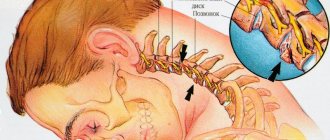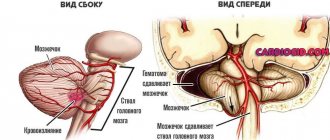A lot of work, little sleep, prolonged stress - and the eye begins to twitch. A condition familiar to many. How to help yourself if a nervous tic causes inconvenience or starts at the wrong time? The head of the Pain Clinic of the First City Hospital, neurologist Ekaterina Abramova, says
— Many people are accustomed to calling twitching of the upper or lower eyelid a tic. However, in neurology this syndrome has a different name: myokymia. But if the eyelid contracts completely or both eyes blink intensely, then this is just a tic. Both conditions belong to the group of hyperkinesis and differ in the nature of involuntary movements: how many muscles are involved in the process, how quickly they contract, with what amplitude, etc. At the same time, myokymia is not painful, usually occurs against the background of stress or overwork and very rarely has a serious dangerous reason.
Related article Don't be nervous! 9 ways to quickly calm down
What happens? When we sit at the computer for a long time or read a lot, look at gadget screens, overwork occurs in the muscles that move the eyeball, raise and lower the eyelid, as well as the orbicularis muscle, which closes the eye. Plus, the muscles of the forehead and other facial muscles tense. Due to overexertion and fatigue, the synthesis of neurotransmitters - serotonin, dopamine, adrenaline, etc. - is disrupted in the nerves that are responsible for these muscles. The result is twitching. Impaired production and metabolism of neurotransmitters is directly related to fatigue and stress. And any person has probably noticed something about himself: he didn’t get enough sleep, overworked, got nervous - and his eye begins to twitch.
If the person otherwise feels well, then there is nothing to worry about. And in this case there is no need to see a doctor. Attacks of harmless myokymia can last a few seconds and even occur every day for a week. There are people who experience myokymia every day for several years. The person was examined and no pathology was detected. However, he traces the connection quite clearly: if he sits in front of the TV for too long, his eye begins to twitch. If you walk down the street, everything goes away. It turns out that in this way the body makes it clear that it is time to rest. Therefore, if the eyelid twitches frequently, this is a clear signal: something needs to be changed in your routine and lifestyle.
When eyelid twitching is accompanied by other symptoms - fever, general deterioration in health, etc. - you should consult a specialist. Myokymia can occur against the background of dysfunction of the thyroid gland, deficiency of certain vitamins, and accompany conjunctivitis and other diseases. If a part of the face also joins the twitching of the eyelid, for example, the eyelid and corner of the mouth twitch, that is, the amplitude and area of involuntary muscle contractions increases, they become longer, more intense, and pain appears, then in such a situation you should definitely see a neurologist. After all, more serious causes of involuntary muscle contractions are also possible: from multiple sclerosis to encephalitis (in the latter case, there will be an elevated temperature and a deterioration in general condition).
In addition, some drugs from the group of antipsychotics or nervous system stimulants, called nootropics, can provoke myokymia. In a person whose body is already in a state of overload (for example, during exams, an urgent project, etc.), taking such stimulants can cause hyperactivation of neurons and, as a result, local muscle twitching.
Article on the topic
Keep your eyes open. What diseases can be identified by the iris of the eye?
Physiological causes of twitching
Why does the eye twitch and what should I do? Many people face this question at different times. Twitching of the eyelid causes multiple muscle contractions that occur involuntarily, against the will of the person. This phenomenon in medicine is called hyperkinesis. Eye twitching is also called a nervous tic.
Hyperkinesis can cause a lot of inconvenience to a person. Sometimes attacks last for several hours and do not subside for weeks or even months. It happens that a nervous tic lasts almost continuously throughout the day. This can frighten a person, because twitching of the eyelid indicates certain disorders in the body.
What can cause an eye to twitch? The main reason is a malfunction of the central nervous system. It is she who is responsible for muscle tone and contraction. This failure leads to the activation of muscle tissue, moving simultaneously in the area around the eye.
To get rid of a nervous tic, you need to determine the reason why it occurs. After all, this is not just a physical inconvenience. In some cases, urgent treatment is required. One of the common causes of such failures is constant nervous tension. It has a direct effect on the central nervous system. Some neurological and inflammatory diseases can cause twitching.
People who have suffered a traumatic brain injury may experience complications that manifest themselves as hyperkinesis.
Eye strain
If your right eye twitches after a busy day at work, you can be sure of the cause and know what to do next - take a break from overworking your eye muscles.
Reading for a long time, working on a computer for a long time, watching TV, playing on phones, and poor room lighting lead to eye fatigue.
Regardless of age, eye strain causes, in addition to redness, pain and nervous tics. The eyes, like the whole body, get tired and give a signal about it.
It is necessary to rest your eyes, do exercises and, if possible, not overstrain them.
Other causes of twitching
If your eye twitches, what should you do in such a situation? In most cases, this situation requires consultation with a doctor. It is also worth paying attention to what reasons may cause such a situation. There are 8 main factors that provoke hyperkinesis:
- Tired eyes. Reading in public transport or lying down, watching a movie in the dark for more than 2 hours in a row, or staying in front of a monitor for a long time lead to overload of the eye muscles. This is manifested by twitching of the eyelid.
- Lack of sleep. If a person does not get enough sleep, his nervous system is in constant tension. This can lead to various diseases. One of the symptoms of such a malfunction is eyelid twitching.
- Stress, neurosis. Stress can occur under the influence of a variety of factors. This could be a difficult life situation, drastic changes, including positive ones, even just a constantly flashing light at work. Neuroses are also a consequence of dysfunction of the central nervous system. This situation requires specialist consultation.
- Dry eyes. When reading for a long time or working at a computer for a long time, dry eyes can occur. A person, being in front of a monitor or simply concentrating on something, begins to blink more slowly. As a result, the mucous membranes dry out. Therefore, you need to reduce your time working at the computer.
- Taking antihistamines. Antiallergic and vasoconstrictor drugs can lead to the appearance of a nervous tic. This situation should be indicated in the list of side effects for the drug. Therefore, even ordinary drops for a runny nose can lead to hyperkinesis.
- Caffeine, alcohol, consumption of sweets. Various hormonal problems, as well as in the gastrointestinal tract, gradually accumulate when consuming alcohol, sweets or caffeine. Of course, a nervous tic will not immediately start from drinking a cup of coffee. However, over time, adverse factors significantly affect our body. As a result, various malfunctions may occur, one of which may be a nervous tic.
- Unbalanced diet. A lack of certain vitamins and microelements in the body can provoke the occurrence of hyperkinesis. This is especially noticeable with a lack of magnesium, calcium, and B vitamins.
- Weakened immunity. This situation occurs after infectious diseases. This phenomenon will pass a couple of weeks after recovery.
Nervous tics in children
In children, the disease usually occurs in preschool age due to an unformed and unstable psyche. This means that the child is especially susceptible to stress, and even a minor negative event can harm the child’s health.
The causes of tics in the left eye in a child are:
- birth trauma, suffocation during childbirth,
- fright,
- heredity,
- stress, nervous tension,
- unhealthy diet
- improper reading, sleep and wakefulness patterns.
When a child's left eye twitches, this may be a sign of a serious illness:
- disruption of the central nervous system, viruses, neuralgia and others,
- helminths,
- intoxication.
Boys are most often affected by the disease. In most cases, the tic goes away quite quickly and without consequences. However, a small percentage of the disease becomes chronic.
Moreover, if the left eye twitches in a child 7 years of age or older, this is due to emotional and mental overload. At an earlier age, the cause is a specific disease.
Adults should especially closely monitor the psycho-emotional state of the child. Avoid nervous overload and stressful situations. If tics occur frequently over a long period of time (months), the child should be seen by a pediatrician, ophthalmologist, and neurologist.
It is necessary to treat children's eye tics, since this symptom interferes with the full social adaptation of the child (teenager). Sometimes it signals a serious physical disorder in the child’s body.
Diagnosis of the disease includes:
- general blood analysis,
- blood for calcium and magnesium,
- parasite analysis,
- tomography
Psychological comfort in the family is recommended as therapy.
In addition, the following will help significantly alleviate the child’s condition:
- Geranium leaf compress
- Massage (intensive pressure for 10 seconds on the area of the superciliary arch and the outer (inner) corner of the eye),
- Good sleep and nutrition
- Correct reading mode
- Limiting time watching TV, computer games,
- Taking sedatives and vitamins,
- Herbal medicine: infusions of hawthorn, chamomile, motherwort and valerian.
Preventive measures:
- Hardening, playing sports, walking in the fresh air,
- Correct sleep and wakefulness patterns
- Complete nutrition.
If preventive and therapeutic measures are followed, in most cases the tic of the left eye in children goes away by adolescence.
Types of spasms
If the eye constantly twitches, in most cases a doctor's consultation is required. He will determine what type of pathology it is, determine the causes and prescribe the correct treatment. There are three main types of eye twitching:
- Spasms of the small eyelid.
- Hemifacial type of twitching.
- Essential benign blephospasm.
Many people are familiar with the feeling of an eye twitching for several days. What to do in such a situation? Most often, the cause of this phenomenon is stress, improper reading regimen, unbalanced diet, etc. This leads to a spasm of the small eyelid.
This type of twitching is usually harmless. It is not accompanied by painful sensations. When the unfavorable factor is eliminated, the twitching goes away within a few days or weeks.
The situation is much more complicated if a person’s twitching causes benign blepharospasm. Most often, this disease develops in middle age. Gradually it progresses. Moreover, the disease is diagnosed in women much more often than in men. The pathology begins with frequent blinking. Eye irritation is constantly felt. This is caused by fatigue, external irritants (for example, low-quality cosmetics), as well as stress.
When essential blepharospasm begins to progress, a person develops increased sensitivity to bright light, wind, and polluted air. Vision becomes blurry. Sometimes facial muscle spasms may occur. In some cases, the muscles become so tense that the person cannot open their eyes for several hours. It is a neurological disorder caused by several adverse factors.
Hemifacial spasm is diagnosed much less frequently. In this case, not only eye twitching appears. The tic also affects the muscles around the mouth. Spasms in this case are observed only on one side of the face. This pathology is caused by pressure from the arteries on the nerves of the facial muscles.
Genetic predisposition
A tic in the right eye can be hereditary. No one is immune from genetic predisposition, and eyelid twitching is no exception.
Tourette's disease manifests itself already in childhood, refers to disorders of the central nervous system and manifests itself as a mechanical tic. The exact causes of the disease are unknown.
In adulthood, people suffer from the disease very rarely, and in children, once adolescence ends, the number of tics is significantly reduced. Treatment in this case is prescribed very rarely.
If your right eye is twitching, your ophthalmologist will tell you why, what to do and how to treat this ailment.
But in any case , a thorough examination should be done, based on the results of which the ophthalmologist will prescribe treatment.
Therapy can be not only medicinal with physiotherapeutic procedures, massage and acupuncture, but also regular rest.
When should you see a doctor?
What to do if your right or left eye twitches? It is necessary to eliminate the factor provoking this phenomenon. You should contact a medical specialist in the following cases:
- The tic repeats continuously for a week or more.
- The eyelid twitches very strongly, which leads to involuntary closing of the eyes.
- The spasm affects not only the eyelid, but also other facial muscles.
- The eye turned red, swelling and discharge appeared.
- Vision has decreased.
In these cases, you should consult a doctor. The eye twitches for various reasons. Therefore, treatment should be carried out by a doctor of appropriate qualifications. To determine which specialist to contact, you should first visit a therapist. He will help determine the cause of the pathology, and then refer you to a specialized medical specialist.
If there is a suspicion that such a symptom is caused by disorders of brain activity or blood circulation, you will need to visit a neurologist.
If the eye becomes red, swollen or suppurated, you will need to visit an ophthalmologist. If visual acuity decreases, you should also consult an ophthalmologist. In addition, depending on the type of pathology that caused the nervous tic, additional consultation with the following specialists may be required:
- neurosurgeon;
- infectious disease specialist;
- psychotherapist;
- cardiologist;
- endocrinologist
Self-treatment may not only not give positive results, but also cause harm. Therefore, if certain symptoms occur, you should go to the hospital and undergo a comprehensive diagnosis.
First aid
If your eye twitches a lot during the day, you need to do a number of exercises that will help relieve excess muscle tension. This will ease the condition by reducing the number of contractions. You can do relaxation exercises right at work. To do this, you only need to spend a few minutes of your time.
First, you should sit up straight or get up from your chair. You need to close your eyes and then take a deep breath. The eyes remain closed. This is followed by a slow exhalation. In this case, you should try to relax the muscles around the eyes as much as possible. Next, take a few more inhalations and exhalations.
After this, you need to close your eyes tightly and then open your eyes wide. After this exercise, the unpleasant symptom should go away. This procedure may be needed in an emergency, for example, before a photo shoot or an important meeting, interview, etc.
It is worth considering that such an exercise is effective, but only for a while. If the spasm appears again, you need to look for the cause of its occurrence. Only by eliminating the unfavorable factor can the problem be solved.
How to eliminate a tic
The condition can be completely eliminated if you resort to the following methods of therapy:
- complete and proper nutrition, which promotes the supply of all useful substances in the body and prevents the formation of hypovitaminosis;
- drinking large amounts of water, at least 2.5 liters per day, to thin the blood and promote normal functioning of the nervous and muscular systems;
- visiting a general massage, or for facial muscle tissue, which ensures the supply of useful substances from the blood that increase metabolism and tissue regeneration, has a relaxing effect;
- nonsteroidal anti-inflammatory drugs based on diclofenac, which can be used orally, intramuscularly, or topically;
- local use of steroidal anti-inflammatory substances;
- use of sedatives prescribed by a psychologist or psychotherapist;
- local or systemic antibacterial therapy to eliminate infection, which can be used for no more than 7 days, after which time resistance develops;
- painkillers for oral use as needed, but not in a long course so that the patient develops resistance to the main active substance;
- surgical treatment of malignant and benign tumors that compress the brain, causing pathological conditions.
It is possible to use other methods of therapy, but only with prior permission from the attending physician. This is necessary in order to avoid side effects from self-medication.
Actions at home
If the eyelid twitches, immediate treatment should be started. Before contacting a specialist, you should follow a number of simple recommendations. In most cases, they help get rid of an unpleasant symptom without visiting a doctor.
You need to take a day off if your eye twitches all day. Treatment in this case involves rest. You need to get a good night's sleep. Most of the weekend should be spent outside. Under no circumstances should you watch TV or sit in front of a computer. It is also worth giving up reading on this day.
In the following days, you need to reduce your consumption of coffee or other tonic drinks as much as possible. Alcohol is contraindicated. Some people find that alcoholic drinks have a sedative effect. But in this case, alcohol will only worsen the situation.
Stress should be avoided. Of course, this is not always possible. But it’s still worth pulling yourself together and abstracting yourself from the situation at work, thinking about something pleasant. You can turn to gentle traditional medicine. They can have a calming effect on the nervous system. You need to monitor your emotional state. Strong outbursts of emotions, both negative and positive, are now contraindicated.
You need to perform special gymnastics for the eyes. This will improve blood circulation. The eye muscles will also become stronger. You should definitely include nuts, cereals, pumpkin seeds and whole grain bread in your diet. These foods contain large amounts of magnesium.
Compresses
In addition to the above actions, you need to apply compresses every day if your eye constantly twitches. This is an effective remedy for relaxing the muscles around the eyes. You need to apply cotton swabs soaked in ice water to your eyelids. This recipe is applicable only if there are no traces of conjunctivitis or inflammatory processes in the eyes.
Tea lotions are safer. Refrigerated brew will be required. It can be either black or green tea, preferably without artificial flavors. The tea leaves are wrapped in gauze and left in the refrigerator. When it cools down, the tea leaves are applied to the eyelids. The procedure lasts 10 minutes.
You can also make lotions from anise. Its seeds are poured with boiling water and left for 1 hour. Then the steamed grains are applied to the eyelids for 10-15 minutes. The decoction can be drunk instead of tea with honey. This calms the nervous system.
ethnoscience
There are many folk recipes that are used if the eye twitches. Traditional medicine knows how to get rid of such a problem. There are many recipes that have a calming effect on the nervous system. Medicinal plants are brewed as tea and drunk throughout the day.
You can make a decoction of chamomile, motherwort or chrysanthemum flowers. These medicinal plants are sold in every pharmacy. The packaging indicates how to brew such tea. You can take the indicated medicinal plants in equal parts and pour boiling water over them. When an hour has passed, you need to strain the product through cheesecloth.
Melissa, linden, and valerian effectively calm the nervous system. These plants are also taken in the form of teas. You can purchase ready-made tinctures at the pharmacy. They are drunk according to the manufacturer's instructions.
What to do if your eye twitches
What to do if the eye has been twitching for quite a long time and you urgently need to cope with the discomfort. In any case, it is initially necessary to find out the cause, and only based on it, determine the tactics for treating a nervous tic.
In case of a certain disease, direct efforts to treat it. This is where medications and pills prescribed by a doctor will come to the rescue.
If the cause of a nervous tic is stress, try to avoid conflict situations if possible. Happened - be sure to relieve stress. I wrote in an article on how to quickly relieve stress , follow the link and read it.
Take sedative tablets, some of which are available without a prescription. But be sure to take the full course.
To get rid of severe eyelid twitching, you can do things that are extremely beneficial for the body:
- Pay attention to adequate sleep. Go to bed early in the evening, sleep for two hours during the day.
- If the cause of the tic is prolonged work at the computer, reduce the time spent at the monitor. Take frequent breaks while working.
Treatment of nervous tics with folk remedies
Using traditional methods, you can relieve nervous tension and relax your muscles. What to do if your eyelids twitch?
- Valerian, peony, chamomile, mint, and sage will help. Make decoctions, brew like tea. Milk and honey are great for insomnia. It is advisable to take them before bed.
- Brew yourself the following mixture: mix chamomile, motherwort and chrysanthemum leaves in equal proportions (can be replaced with peony).
- Compresses. They give a good relaxing effect. Use chamomile, lemon balm, eyebright, green tea, calamus root, St. John's wort, and meadow clover.
- Aromatherapy. If the eye twitches due to severe nervous tension, use the effectiveness of aromatherapy . For relaxation and stress relief, this method is difficult to overestimate. Take baths by adding a few drops of aromatic oils of pine nut, lavender, geranium, and rosemary to the water. There is no way to take a bath - light an aroma lamp and just inhale the aroma of the oil. I have written an interesting article, follow the link and read it.
Nutrition for nervous tics
In addition to treating pulsation of the upper and lower eyelids with folk remedies, it is necessary to provide the body with adequate nutrition.
At home, when deciding what to do if your eye twitches, doctors recommend taking a course of multivitamins containing magnesium, which helps calm nerve cells.
Deficiency of calcium and magnesium, which relieve increased excitability of neurons and are responsible for the good functioning of the nervous system, is a common cause of problems with the eyelids.
Magnesium reduces nervous excitement and relaxes muscles. Athletes and people engaged in physical labor are especially often susceptible to deficiency of the beneficial substance. A lack of magnesium leads to the risk of seizures and sleep disturbance.
In this case, pay attention to nutrition. Include fish, beans, chocolate, rye bread, wheat bran, bananas, and watermelon in your daily diet. Nuts, sunflower seeds, sesame seeds, and pumpkin seeds are healthy. To get rid of regular eyelid twitching, include foods rich in calcium in your diet. The mineral improves the functioning of the nervous system and improves the functioning of muscle tissue.
When creating a menu, add cheese, dairy products, almonds, seeds, peanuts and other nuts, and dried apricots to your diet.
Exercises for strong eye pulsation
In the case of a fairly frequent manifestation of a nervous tic, you need to know what to do if the eye twitches in order to organize first aid and stop the tic.
I suggest a few simple exercises:
- To help yourself, relax, and then do a simple exercise: squeeze your eyelids tightly and at the same time take a deep breath. Then exhale slowly and open your eyes. Repeat the exercise 5 times. A simple exercise will relax the nervous system.
- Sometimes this method works well: blink your eyes quickly for a minute.
- Palming exercise. A well-known exercise that helps relieve eye strain and allows them to rest.
Cover your eyes with your palms (close your eyelids). The center of the palms should be directly above the eyeballs. Rest your elbows on the table and sit for 5-10 minutes. Repeat several times a day. The eye will stop twitching extremely quickly.
If you think that tic of the upper and lower eyelid is a harmless phenomenon, then you are in vain. It is quite possible that this is a symptom of a serious chronic nervous disorder. I suggest watching a useful video with information about the causes and treatment of eyelid twitching, the mechanism of nervous tics and tips on what to do if the eye twitches. Be healthy, friends. With love... Galina Nekrasova.
Treatment
If the eye twitches, more serious treatment may be required. By contacting a neurologist, you will need to undergo an examination. After this, the doctor will assess the severity of the failure and prescribe medication. The regimen includes many different drugs. They are chosen depending on the type of disease that caused the eye twitching.
Most often, patients are prescribed to undergo a course of physiotherapy and massage. Comprehensive treatment will help restore the functioning of the nervous system. Folk recipes will be ineffective in case of serious failures.
Taking certain medications (reaction to psychotropic medications)
Twitching of the eyelids can be caused by psychotropic medications intended for the treatment of psychoses, neuroses and epilepsy and, accordingly, affect the central nervous system.
Psychotropic drugs include:
- antidepressants;
- antipsychotic drugs;
- psychosomatic drugs.
In some cases, taking psychotropic drugs has a number of very complex side effects , including eye twitching. As a result of such manifestations, treatment with potent drugs is stopped.
Solving psychological problems
Psychological trauma may explain why the eye twitches. What to do in this case? It is worth noting that drugs in this case will be powerless. If some situation does not give a person peace, he has experienced psychological trauma and cannot overcome its consequences himself, he needs to consult a psychologist. In this case, only the right therapy will help remove the cause of the nervous breakdown. You need to think positively. This gives inner peace.
Having considered why the eye twitches and what to do in such a situation, you can quickly get rid of not only the unpleasant symptom, but also the main reason that provoked its appearance.











